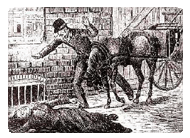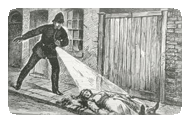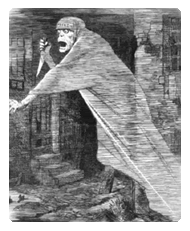Tuesday, July 05, 2005
Wilding's Book
I decided (if anyone cares) not to devote too much time to the John Wilding book Jack the Ripper Revealed. At least, in reviewing it. This is partly because it's awful, and partly because there are too many things to deal with in it. I would end up rewriting the whole book itself. Waste of time.
What I can do is refer to The Ripper Lady's post on Sherlock Holmes and what she says about "induction vs. deduction." I believe she was referring to Cornwell's book, but it also applies here. Ripper Lady uses the old axiom:
1) Men are mortal
2) Aristotle is a man
3) Aristotle is mortal
Makes sense, right? One fact follows another until you get to the most specific fact. Suffice to say, Wilding doesn't do this. He starts with a 1 and 2 that prove 3 without proving 1 and 2 in the first place!
Wilding takes the royal conspiracy to an absurd height by proposing that Prince Bertie, next in line to the throne, had a liason with Mary Kelly and left a "souvenir" with her. Multiple entendres, as Phil Ken Sebben would say. He left an heirloom and also made her pregnant. She decides to blackmail him. So far, so much crap, but at least plausible. What Wilding says is that M. J. Druitt, a failed barrister and J. K. Stephen, tutor to Prince Eddy (Bertie's son) take it upon themselves as loyal royalists to silence everyone who knows about the affair and Mary herself. Yet at one point, they use Mary to lure one of the prostitutes to her death! Then they have a falling out and Druitt is murdered to silence him. Okay, I promised myself that I wouldn't give this more air than it deserves. To use the formula, though:
1) "Druitt and Stephen knew each other." Not proven. There's a lot of "could have known," "may have known the same people" line of crap that wouldn't pass the laugh test.
2) "Druitt and Stephen were best friends, so close that they would do anything for each other." See #1
3) "Druitt and Stephen were such staunch loyalists that they would do anything to save the crown." There's no proof Druitt cared one way or another about the crown and to put forth a blanket statement that every English person would care enough to commit murder on behalf of the crown is just stupid, which is what Wilding must be saying because he never gives a reason for Druitt's involvement, except as a purported (not proven) lover of Stephens. Stephen, tutor to Prince Eddy, was a nutjob who wrote bad poetry, but no one knows anything about his political leanings. His family was distinguished, and his relative was the judge in the Maybrick fiasco, but that says nothing about him. The only interesting thing is that he was related to Virginia Woolf, another person who suffered mental illness and then committed suicide. Reading some of her works, I see why. :)
And on and on. Really, the completist Ripperphile would have this book, but don't get it if you want to learn anything about the case. It's full of inaccuracies and errors. At one point, Wilding refers to the book The Mystery of Jack the Ripper by Leonard Maltin. Either Wilding just got mixed up or he was already eyeing the film version of his book, because the author of the Mystery of Jack the Ripper was Leonard MATTERS, not Maltin, who is a film critic. This is typical of the book. Plus a lot of "it's" vs. "its" type mistakes that drive English teachers crazy. Would the book be a tour-de-force with the mistakes corrected by a punctilious copyeditor? No. Even getting beyond the errors, there's not enough here to sustain the interest of anyone outside of a Ripper nutjob who needs to read everything about the case. Like me.
jack the ripper
What I can do is refer to The Ripper Lady's post on Sherlock Holmes and what she says about "induction vs. deduction." I believe she was referring to Cornwell's book, but it also applies here. Ripper Lady uses the old axiom:
1) Men are mortal
2) Aristotle is a man
3) Aristotle is mortal
Makes sense, right? One fact follows another until you get to the most specific fact. Suffice to say, Wilding doesn't do this. He starts with a 1 and 2 that prove 3 without proving 1 and 2 in the first place!
Wilding takes the royal conspiracy to an absurd height by proposing that Prince Bertie, next in line to the throne, had a liason with Mary Kelly and left a "souvenir" with her. Multiple entendres, as Phil Ken Sebben would say. He left an heirloom and also made her pregnant. She decides to blackmail him. So far, so much crap, but at least plausible. What Wilding says is that M. J. Druitt, a failed barrister and J. K. Stephen, tutor to Prince Eddy (Bertie's son) take it upon themselves as loyal royalists to silence everyone who knows about the affair and Mary herself. Yet at one point, they use Mary to lure one of the prostitutes to her death! Then they have a falling out and Druitt is murdered to silence him. Okay, I promised myself that I wouldn't give this more air than it deserves. To use the formula, though:
1) "Druitt and Stephen knew each other." Not proven. There's a lot of "could have known," "may have known the same people" line of crap that wouldn't pass the laugh test.
2) "Druitt and Stephen were best friends, so close that they would do anything for each other." See #1
3) "Druitt and Stephen were such staunch loyalists that they would do anything to save the crown." There's no proof Druitt cared one way or another about the crown and to put forth a blanket statement that every English person would care enough to commit murder on behalf of the crown is just stupid, which is what Wilding must be saying because he never gives a reason for Druitt's involvement, except as a purported (not proven) lover of Stephens. Stephen, tutor to Prince Eddy, was a nutjob who wrote bad poetry, but no one knows anything about his political leanings. His family was distinguished, and his relative was the judge in the Maybrick fiasco, but that says nothing about him. The only interesting thing is that he was related to Virginia Woolf, another person who suffered mental illness and then committed suicide. Reading some of her works, I see why. :)
And on and on. Really, the completist Ripperphile would have this book, but don't get it if you want to learn anything about the case. It's full of inaccuracies and errors. At one point, Wilding refers to the book The Mystery of Jack the Ripper by Leonard Maltin. Either Wilding just got mixed up or he was already eyeing the film version of his book, because the author of the Mystery of Jack the Ripper was Leonard MATTERS, not Maltin, who is a film critic. This is typical of the book. Plus a lot of "it's" vs. "its" type mistakes that drive English teachers crazy. Would the book be a tour-de-force with the mistakes corrected by a punctilious copyeditor? No. Even getting beyond the errors, there's not enough here to sustain the interest of anyone outside of a Ripper nutjob who needs to read everything about the case. Like me.
jack the ripper
Labels: Jack the Ripper, Jack the Ripper and Me
















HA HA HA...dangly parts
Boy, I missed dangly parts.
Maybe I just go through life with my eyes closed or maybe my brain just fills in the gap for me, but I have never ever in my entire life seen it's used in place of its (or vice versa) in a published book. Just wow! What a lazy editor! Or perhaps an editor that doesn't exist.
No editor? Could be true. More and more of the Ripper books are self-published, because it's (its) so cheap to do nowadays and hope that a distributor will pick your book up later.
I could show you tons of such mistakes, even in literature books. When I see them, it's like a cow jumped on the tracks in front of the train I was riding. Just slams everything to a halt and I get so pissed that I can't read the next sentence for a bit. I'm taking Prozac, by the way. "I'm going to my calm place, I'm going to my calm place."
Poor cow.
And what are you doing riding around on trains all the time, anyway?
Post a Comment
<< Home